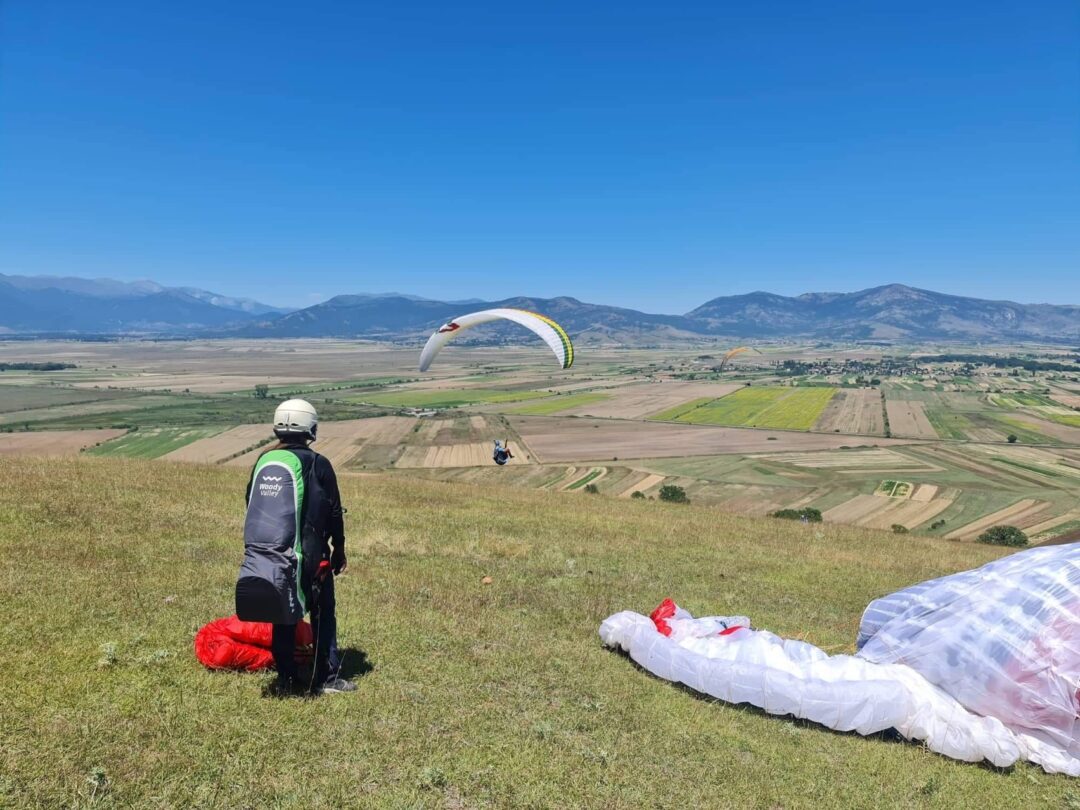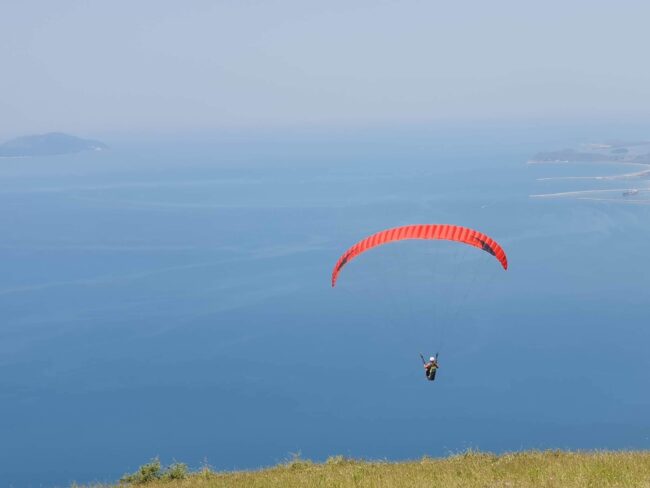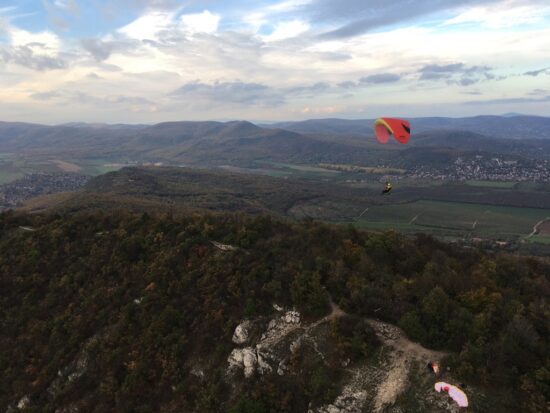News
Coffee break interview – Gréta Dékány: Paragliding

Clarity In today’s interview, we talk to our junior advisor Gréta Dékány, who has chosen an unusual sport as a hobby. 😊 Clarity on land, water and air.

Clarity When did you first get into paragliding? Where did you get the inspiration to try it?
I was introduced to paragliding through a friend I knew at university. I had heard about it before, but I couldn't imagine that it was possible in the "hills" of Hungary. I asked her a lot of questions and got interested in the sport. I've always been a fan of active recreation, I've swam, dived, run half marathons, played volleyball, ballet, jumped rope, and still go to the gym regularly, but somehow I've never found the real passion and commitment in any of the sports.
One day she invited me to go and see what the sport was all about. I went with her to Csolnok, and the atmosphere itself was enchanting. There were parachutes everywhere, instruments, pilots talking to each other on the radio in the air. When my friend unpacked, equipped her things and soared to the air, I had a feeling that yes, this is going to be the feeling that would accompany me for the rest of my life. I enrolled in the next spring course, and since then I've been going flying whenever the weather permits.

 Clarity How long does it take to learn this sport? When did you first go skydiving solo?
Clarity How long does it take to learn this sport? When did you first go skydiving solo?
You can try tandem flying before the course, but I didn't pay because I knew I would like it. From the day of the course, I am alone in the air, with radio guidance during instruction and on the tours. The course consists of theoretical and practical instruction, with practical sessions starting in the spring.
First we learn parachute handling on a flat terrain, then we gradually go up in altitude. After that you will start from a 1m, then 3m, 5m and then higher and higher hills, and after a few weeks you will start from high starts, when your parachute handling is relatively stable. The exam is in June or July. The weather has a big influence on when you can go out and have a training day or when it's not exactly starting time. Due to the fact that the weather is thermal during the day, meaning that the heat is relatively more pronounced upwards, we only flew in stable, calm weather from 9am to 12 noon or 4pm to evening at the start. If someone wants to try paragliding they usually fly with passengers at this time. You can also take the exam in Hungary, but we were offered the opportunity to take the pilot exam on the tour to Macedonia, so a few of us from the course took the exam there at the end of July. During the exam you have to demonstrate various manoeuvres with the parachute, but the instructor is still present at this time, giving advice if there is a problem and telling you how to avoid it. After becoming a pilot, all you can think about is why didn't you start paragliding earlier?
Clarity Where do you fly?
It varies a lot, depending on the wind direction. I like the southern starting points the best, these starting points are mainly around Pilisvörösvár. If there is a north-easterly or north-westerly wind, I usually go to Óbuda or Hármashatárhegy. On weekends, we often travel further afield, with Eger, Gyöngyös and Salgótarján among my favourites. In Hungary, Csobánc is a popular take-off point because it can be flown in all directions and you can even fly over Lake Balaton from there. You don't choose the wind direction, we look at the meteor and choose the launch site with the right wind direction. This is tempered by the fact that paragliders are picky, they don't like weak or strong winds, we like a base wind of 2-4 metres per second and the maximum winds are 8 metres per second. It is possible to fly in stronger winds, but this requires a more skilled pilot.
Every year I go on a shorter and a longer flying. Abroad, there are football field-sized, grassy, well-maintained launch sites with high elevation differences, you can fly for hours. I usually get off after 3-4 hours of continuous flying because I'm out of water, hungry, thirsty and de-concentrated. When I'm up in the air, my mind is completely switched off, I'm not thinking about anything else but staying up and going as high as possible. I haven't found any other activity like that. I've only flown in relatively easy to fly mountains abroad, like Tribalj in Croatia, Tolmin in Slovenia, but I'm about to fly to Albania. My big dream is to fly in the Dolomites, Nepal and Colombia, but these are more technical places where you need a moderately skilled pilot and a medium category paraglider. Fortunately, we don't fly with "death dividers" anymore, today's parachutes are very safe, they can almost handle emergencies on their own - but we don't start climbing mountains on Everest either.
Clarity What was your most memorable flight?
Every flight is different. There are times when the weather is so smooth it feels like you're sitting in an armchair, and there are times when the thermals are so strong you feel like you're in a washing machine. If I had to name a memorable flight, I could name two defining moments. One I learned from and the other I really enjoyed.
The first slap in the face came when I landed my new canopy in a tree on Hármashatárhegy. Luckily, I wasn't hanging from a tree in a place where the tree was low. It was a good lesson in many ways. By the way, there are two types of paragliders: those who have been up a tree and those who will be.
What always comes to mind when people ask me what it's like to be up there is the feeling I had when I was the first pilot to climb above 1,800 metres in Macedonia. I took off, looked for a thermic and started circling around the thermic to get out. The instrument beeped so I knew I was soaring steadily, and then suddenly I noticed I was very close to the cloud base. I looked at the instrument and I was 1800 metres from sea level, with a 1000 metre difference in altitude below my feet, all the pilots were flying lower than me. I looked up from the instrument, just admiring the scenery, and I felt very lucky to be able to experience that.
Clarity Who do you recommend this sport to?
Anyone who is looking for something special in life. People always ask you, are you not afraid? Yes, I am. People who are not afraid are liars or fools. It's an extreme sport, everyone has a start startle, but you learn to overcome it over time, you trust yourself, your skills and your parachute.
